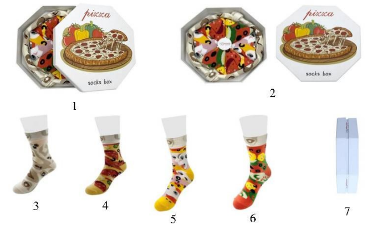Judgment of the General Court on the Community design of a set of socks and its packaging
The Court dismissed an appeal against the May 20, 2022 decision of the EUIPO Board of Appeals. EUIPO brought by Cyprian Iwuć in a case for the invalidity of the Community design of Xangzhou XiangHui, a company based in China. The design was challenged primarily for lack of novelty under Article 25(1)(b) of Regulation No. 6/2022, in conjunction with Article 5 thereof. However, the applicant did not plead the lack of individual character of the disputed design, which made the judgment ultimately unfavourable to the applicant.
(Court ruling of September 6, 2023, T-492/22)
On December 15, 2020, the IWUC, which was the Applicant’s predecessor in title, filed an application for cancellation of the design right (RCD 008043228) for a set of socks and a packing box.
Specifically, the application was filed based on the Applicant’s earlier Community Design RCD 004506947).
The Applicant also provided screenshots of his social media accounts, and provided a hyperlink to Amazon’s platform, which showed that the similar products he sold were available there as of 2016.
Despite the above, the Cancellation Division dismissed the motion to cancel. The Applicant appealed to the EUIPO Board of Appeals, which, in its decision from May 2022, dismissed the appeal finding it without merit.
First of all, it stated that the Applicant’s design is not identical to that of the other party to the proceedings, and that the features that distinguish the two products should be considered essential.
The Applicant appealed to the General Court and demanded that the decision be annulled and the right to the RCD design 008043228 be cancelled or, alternatively, that its registration be restricted to a cardboard box.
He claimed the Court violated Article 5 of the Regulation, further claimed that it failed to examine the application based on all the evidence presented and erroneously concluded that the Chinese company’s design could be considered new. According to the Applicant, this was due to the fact that the Court failed to consider the online evidence, and the question of the novelty of the design was examined only on the basis of the Applicant’s design registration certificate, with the certificate showing only one of the variants of socks in designs depicting pizza.
The CJEU dismissed the plea because, among other things:
- the sets differed in patterns and colours and in the arrangement of the socks
- the boxes differed in shape – the Applicant’s box has a square shape with two truncated sides, and the opponent’s box has an octagonal shape
- the boxes contained the words „pizza” and , „sock box”, but they were in different places
- there were various pictures on the boxes
- and at the same time, the above differences to be significant and discernible.
The reason the Court did not consider evidence other than the design (RCD 004506947) was that the Applicant did not claim that this evidence showed designs earlier than those in the challenged design. Nor did he specify the differences between the designs considered by the Court and those that were disregarded. Accordingly, the Court found that the Applicant’s arguments were too general and unable to challenge the Court’s findings.
The Applicant also claimed that arranging the socks in the shape of a pizza and placing them in a box is evidence of copying his idea. Possible differences between the various designs or colours on the socks are not particularly significant, since the „sock pizza” itself carries a similar message and consumers are unable to distinguish between the products. However, the Court emphasized that with the above arguments, the Applicant challenged the individual character of the RCD 008043228 design within the meaning of Article 6 of Regulation No. 6/2002, and not its novelty, the lack of which it pointed out in its application for invalidity. The Applicant never invoked this ground for invalidity, so the Applicant 's allegation was without merit.
As for the second demand, i.e., limiting the registration of the design to a cardboard box, the Court found that the conditions were not met, since the demand for cancellation of the right to the RCD design 008043228 was dismissed, and the company that owns the right to this design did not relinquish its registration. The demand was dismissed as unfounded, as was the entire action for annulment of the Board of Appeals’ decision dated 20 May 2022.
Summary
The judgment in question is consistent with the case law on the grounds for invalidating Community designs. In cases of this type, it is necessary to present precisely dated evidence, as well as it is essential to cite adequate grounds for invalidation. Lack of novelty can only be challenged on the basis of previous identical designs. In principle, any differences between the designs will undermine the allegation of lack of novelty of the design.
See more:
Review of CJEU case law from 2.02.2026 to 6.02.2026
Judgment of 5 February 2026, EUIPO v Nowhere Co. Ltd, Case C‑337/22 P – The case concerned opposition proceedings relating to the application for registration of the EU figurative trade mark APE TEES: – On 30 June 2015, Mr Ye filed an application for an EU trade...
Review of CJEU case law from 26.01.2026 to 30.01.2026
Judgment – of 28 January 2026 – Montepelayo, SLU v. EUIPO, Case T-203/25– The case concerned opposition proceedings against the registration of an EU word mark. – Montepelayo, SLU filed an EU word mark application for TELOTRÓN for goods and services in Classes 5...
Review of CJEU case law from 19.01.2026 to 23.01.2026
Hesse v EUIPO – 19.01.2026 – Ferrari (TESTAROSSA), Case C‑597/25 P– The case concerned the procedure under Article 58a of the Statute of the Court of Justice for determining whether an appeal against a judgment of the General Court in EU trade mark proceedings should...


